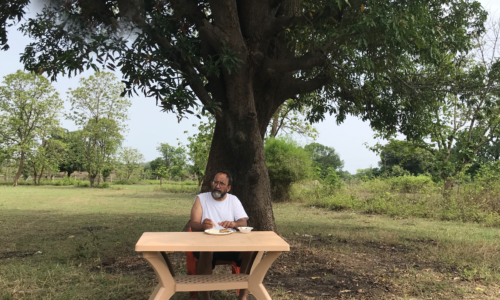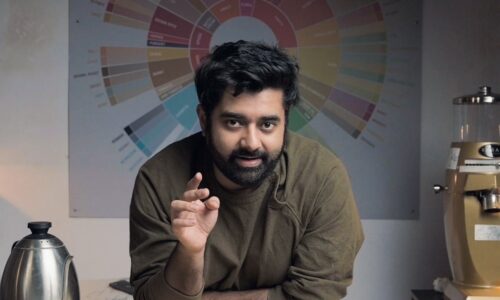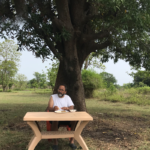This Story is a 6 mins Read |
In the fabric of life, some threads are spun from the harshest beginnings, weaving a story of resilience, determination, and eventual triumph. Such is the saga of Dr. Milind Mane, a beacon of hope whose journey from the dusty lanes of Akola district in Maharashtra to the hallowed halls of medicine and politics stands as a testament of the indomitable human spirit. Right from begging on the streets to becoming a MLA, the story of Milind Mane is an inspiration on how the power of not giving up can transform the hardest of the battles into rays of sunshine.
In a heartfelt exchange with Nagpurified, Dr. Milind Mane bares his soul, revealing the countless hurdles he faced and the incredible journey that propelled him from obscurity to the corridors of power as an MLA.
इक दिन बिक जाएगा, माटी के मोल
जग में रह जाएंगे, प्यारे तेरे बोल
दूजे के होंठों को, देकर अपने गीत
कोई निशानी छोड़, फिर दुनिया से डोल
My favourite song, from the film Joker, resonates with the core of my being. It reminds me that our time here is finite, and we must strive to leave the world a better place than we found it.”
Born into a Dalit family, poverty was the air I breathed. When my mother went into labor, there was no fancy hospital, just a bullock cart ride that seemed to stretch for eternity. That’s how I entered the world, under a sky filled with a million unanswered questions. Adopted by my father’s brother at a tender age, I started my education in the village of Khandwa, the birthplace of the legendary singer Kishore Kumar. Ironically, the melody of education wasn’t always easy for me. I began my education in Hindi medium, which posed difficulties later on in my educational journey.
Years later, my uncle’s transfer to Maharashtra flipped the page on my story. The familiar comfort of Hindi vanished, replaced by the unfamiliar Marathi. In seventh grade, the harsh realities of life as a Dalit child hit me hard. Financial constraints forced me to graze goats and help with housework, leaving no time for studies. One peculiar event in my life comes to mind. One afternoon, after school, I resorted to my daily chores of grazing the goats. It was a common practice to collect Gondh (a highly prized Ayurvedic plant well-known for its indispensable medicinal properties) from a babul tree to sell it later. I climbed one such babul tree and accidentally slipped and fell into a bed of thorns under the tree. I was severely injured with bruises and thorns piercing my body. As the next day my exams were to be held, I couldn’t appear for the same and consequently, I failed.
Eighth grade brought another challenge – a crippling drought. It was known that the Indian Government is importing grains from the United States Of America. The grains that were meant to be consumed by pigs in the States were fed to humans in India. In such unforgiving times, I was allotted with the duty of assisting my mother in the fields for menial labor after school hours. One day after school, as I was on my way to work, and met a few friends and lost track of time. As I reached home, my mother, enraged with my absence at work, beat me up mercilessly. I was so disheartened by this treatment that I decided to earn money on my own.
Boarding a train with my friend Deodhar, we arrived at Akola railway station, hopeful for work. Sadly, our search yielded nothing. We washed utensils at a restaurant, but the owner offered only tea and cookies instead of money. Attempting to earn as coolies on the station, we were met with hostility from the station’s regular employees who beat and chased us away. Hungry and desperate, we resorted to begging, sleeping at the station. Eventually, our family found us, but not without repercussions. My father’s anger was palpable as he reprimanded me for leaving, punishing my mother as well.
My academic journey suffered due to these hardships. Failing in the first semester of 8th standard, I eventually rebounded in the second, topping my class. With newfound determination, I persevered, successfully completing grades 8 through 10. Due to my excellent grades in 10th grade, my father urged me to pursue a career in medicine like Dr. Babasaheb Ambedkar, who is no less than a god for us. Initially, I misunderstood Babasaheb Ambedkar’s profession, thinking he was a medical doctor. Upon learning he held a doctorate in law, my admiration only grew. Inspired by his legacy of empowerment and service, I pledged to become a doctor myself.
Resultantly, during my 11th and 12th grades, I studied science in English medium, which was a big change from Marathi. It was tough, especially with mathematics, and I failed 12th grade twice. Feeling defeated, I nearly gave up on my dream of becoming a doctor. In the summers, I worked as a casual laborer for Indian Railways, earning just 3.10 paise per day, using the money to buy clothes and books for the year.
When I decided not to try for 12th grade again, a teacher from my school told me about a new college opening for 11th and 12th students. With their support, I passed 12th grade with flying colors.
Uncertain about MBBS admission, I enrolled for B.Sc in Akola. To my surprise, I received a telegram after just 6 days, offering a spot in BDS at Government Medical College. Later, I got another telegram, this time for MBBS at Indira Gandhi Medical College. My journey as a beggar on the streets of Akola found its temporary destination at IGMC, Nagpur. It was only the beginning of a lifetime of experiences that shaped my achievements.
And well, My political journey began when I became president of the Students Association at medical college. Always keen on solving student issues, I was tagged by my peers to have a “Netagiri” attitude. During my tenure as a student body president, I met people who are now the biggest names in the political and administrative fields. One such man is none other than the Minister for Road Transport & Highways in the Government of India, Shri Nitinji Gadkari. I met Mr. Nitin Gadkari in 1982. Our regular visits to Jagat restaurant for tea are some of the memories I cherish.
After graduation, I opened my clinic in Mominpura and joined Ambekarwadi Prerna Manch in 1993, affiliated with the Janta Dal Party. My first electoral battle was in 1997. I contested Municipal Corporation elections independently, earning just 135 votes. In 2002, I ran again, this time under the Republican Party of India led by Prakash Ambedkar, the grandson of Dr. Babasaheb Ambedkar, and I received 2200 votes. In 2004, I contested for Member of Legislative Assembly elections but fell short, securing 3500 votes.
A particularly disturbing phase of my political career occurred in 2006. In Maharashtra, a tragic event occurred known as the Khairlanji violence on September 29, 2006. Four members of the Bhotmange family, belonging to a Scheduled caste, were brutally murdered in Khailanji village. I protested vehemently against these killings, leading to my arrest and a 14-day imprisonment under the Maharashtra Prevention of Dangerous Activities Act, 1981. Despite the risks, I stood firm in seeking justice for the victims and challenging the deep-rooted prejudices in society.
In 2009, I contested again for State Legislative Assembly elections. Though I lost, receiving 24662 votes as an independent candidate was remarkable. Mr. Nitin Gadkari invited me to join the Bhartiya Janta Party recognizing my efforts. In 2012, I ran for corporator elections, but unfortunately lost. However, in 2014, joining the Bhartiya Janta Party proved fruitful. Despite starting with just 135 votes, my journey saw remarkable growth. Winning as an MLA in 2014 with 69000 votes was an inspiring feat, showcasing the power of determination and perseverance in the face of challenges.
During my political career, my focus was on enacting laws to combat Sickle Cell Anemia. Sickle cell disease is a major genetic disorder amongst Scheduled Caste (SC), Scheduled Tribe (ST), and Other Backward Communities (OBC) population groups of Maharashtra. I was determined to enact an action plan at an administrative level to help curb the prevalence of the disease. This led to the launch of the National Sickle Cell Anemia Elimination Mission in 2023 by the Narendra Modi government, aiming to eradicate the disease from India by 2047. Another achievement was the declaration of November 7th as Student’s Day (Vidyarthi Diwas) by the government. This date marks the beginning of Dr. Babasaheb Ambedkar’s schooling in 1890 at Pratap Singh High School in Satara district. These accomplishments reflect my dedication to improving public health and honoring important historical milestones.
Life wasn’t easy. There were days when the weight of responsibility felt like a mountain on my shoulders. But looking at my wife, Sarita, her eyes filled with unwavering belief, reignited the spark within me. Every sacrifice, every late night, wouldn’t have been possible without her unwavering support. Together, we built a life, not just for ourselves, but for our children.
As we continue to serve our community, I’m reminded of the words: “In the depths of hardship, lies the seeds of greatness.” Let each trial be a stepping stone, each setback a lesson, and each victory a testament to the human spirit’s boundless capacity for resilience and renewal.
Though my journey may end,
the ripples of change I create
will forever echo in the sands of time.



